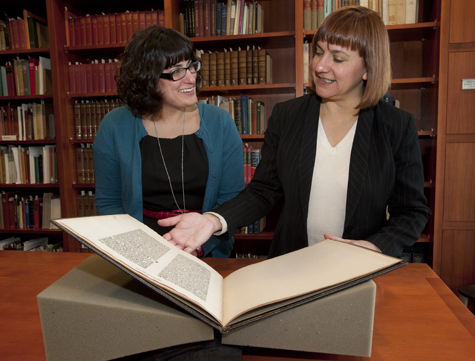
Ancient clay cuneiform tablets. Books in Greek and Latin owned and marked by Thomas Jefferson. Original raw footage of an interview with Curtis Jones, cousin of Emmett Till, a 14-year-old African-American murdered in Mississippi in 1955, used in the historic documentary Eyes on the Prize.
These aren’t items one might expect to see when visiting a typical library. But pay a visit to Washington University Libraries’ Special Collections, and you’ll find these and more rare and unique items.
Collecting and preserving these invaluable resources for future generations of scholars is the mission of WUSTL’s Special Collections and of Anne Posega, head of Special Collections for University Libraries since 1999.
These materials are available to researchers but usually can’t be checked out and toted home like a typical library book. Instead, researchers come to University Libraries and work with Posega and other Special Collections staff to view the item in a secure, safe environment.
“It’s a balance of access and preservation,” Posega says. “There’s no point in having these materials if no one can use them — but they have to be used in a way that ensures they still are here in 200, 400 years. Our role is to find the right balance.”
In the past 10 years, Special Collections has had to find that balance for more and more items. Under Posega’s leadership, Special Collections has grown dramatically. Two new units — the Film & Media Archive and the Modern Graphic History Library — have been added, and storage needed to house Special Collections materials has tripled.
A growth in collections and outreach has resulted in an increased interest in the collections, and the number of WUSTL class visits to Special Collections has tripled as well.
“Anne is incredibly capable and hard-working, balancing a full family and personal life with responsibilities that have grown exponentially since she first became head of Special Collections,” says Shirley K. Baker, vice chancellor for scholarly resources and dean of University Libraries.
“In addition to the usual remote scholars who contact us about our materials, we now have a steady stream of Washington University classes and researchers taking advantage of our unique collections. Students especially are astonished and delighted at being able to examine and handle — carefully — materials created centuries ago and often exceedingly rare.”
Finding her niche
Posega grew up in Rockford, Ill., reading “everything I could get my hands on,” she says. She tackled Jane Austen novels in middle school. In high school, she moved on to Flaubert, Zola and Dostoyevsky.
“I would look at reading lists from the classes I couldn’t take, and I would try to read books on those lists,” Posega says.
But Posega, whose father was a mechanical engineer, also enjoyed math. She began her freshman year at St. Mary’s College in Notre Dame, Ind., in 1981 intending to double-major in English and math.
Posega chose St. Mary’s — a women’s college approximately 200 miles east of her hometown — for its small-college feel paired with the advantages of having a larger university community, the University of Notre Dame, across the street.
Posega eventually settled into a network of student writers, spending hours talking literature. She began to write poetry.
She soon realized there “weren’t enough hours in the day” to passionately pursue writing and math, so she dropped math to a minor and added French and writing as majors.
“I don’t think I had a clear career plan,” she says. “I had a vague idea of getting a PhD and teaching, so I envisioned something academic.”
A good change of plan
Posega applied to both WUSTL’s and Cornell University’s master of fine arts programs in writing, and, as a backup, the University of Illinois at Urbana-Champaign’s doctoral program in English.

She was accepted at all three and offered a full fellowship at Washington University. After her first year at WUSTL in 1986, she learned her fellowship would be as a graduate assistant in manuscripts at University Libraries — and she wasn’t happy about it.
“I thought they must not have considered my writing good enough to make me a teaching assistant in writing or English,” she says. “But it turned out to be a really good change of plan.”
Posega spent the next two years in WUSTL’s manuscripts department, assisting researchers and reading the letters, journals and drafts of distinguished writers such as Stanley Elkin, Bill Gass and James Merrill. It was “a snoopy thrill” that offered behind-the-scenes glimpses into the writing process, which Posega found fascinating.
In 1988, Posega, still working toward her MFA, became an assistant in Special Collections. When the WUSTL archivist passed away in 1989, Posega became acting archivist for a year, managing the preservation and access to a trove of documents recording the history of WUSTL and St. Louis.
Sometime between examining century-old original drawings of the Eads Bridge and marveling at the craftsmanship of rare books, Posega, the reluctant librarian, realized she had been assigned exactly where she belonged.
In 1991, after earning her MFA, Posega enrolled in the master of library science program at the University of Missouri-Columbia. From 1991-95, Posega took extension classes in St. Louis and drove to and from Mizzou. Soon after Posega earned an MLS degree, the position of curator for University Libraries’ modern literature and manuscripts collection came open.
WUSTL performed a national search, which found the best candidate already had experience working with the university’s manuscripts: Posega.
In 1998, the head of the university’s Special Collections left to attend law school, and another national search was held, with the same result. After serving as interim head for a year, Posega was named head of Special Collections.
“The library went through two national searches for Anne’s positions. She had to really compete for them, and she ended up on top,” says B.J. Johnston, associate dean of University Libraries. “She’s just really good at what she does, and she knows the materials.”
Priceless records of history
In fall 2002, four semi-trucks pulled in front of Washington University’s West Campus building. Inside each trailer were hundreds of boxes of film. Movers unloaded and marched the heavy cardboard boxes into the university’s new Film & Media Archive.
Inside the boxes was film from historic documentaries and interviews by Henry Hampton’s film production company, Blackside Inc. The WUSTL alum’s most famous work is Eyes on the Prize, a 14-episode documentary on the American civil rights movement.
Among those interviewed for the documentary — and whose raw interview footage was contained in the collection — were Jones; Coretta Scott King, wife of the Rev. Martin Luther King Jr.; and Burke Marshall, head of the Civil Rights Division of the U.S. Department of Justice during the John F. Kennedy administration.
These interviews are priceless records of history, and, the previous year, WUSTL had been awarded the opportunity to house and preserve them. Only snag was, no WUSTL library staff or facility had been trained or built to preserve film.
No problem. Posega worked with consultants to turn unfinished space at West Campus into the university’s Film & Media Archive and hired a film archivist.
The archive, which started off with one person and an assistant, now is up to six people. Last year, the archive applied for and received a $550,000 grant from the Mellon Foundation to begin further preservation of the Eyes on the Prize documentary and footage.
Thanks to work by Posega and her staff, the Henry Hampton Collection is cared for and available to researchers. The same is true for collections held in the Modern Graphic History Library, Rare Books, Manuscripts and other Special Collections areas. And these unique materials are what make Washington University Libraries such a valuable resource for scholars.
“Every research library will have access to the same general collection of recent books and journals,” Johnston says. “But Special Collections are primary materials, rare materials, and that’s what sets them apart. These are materials that everyone else doesn’t have.
“If you come and look at these materials, you are holding a piece of history in your hand.”
Fast facts about Anne Posega
Family: Her husband, Christopher Rappleye, is a fellow WUSTL MFA in writing alumnus who teaches English at the MICDS Upper School. The couple has three children: a 16-year-old daughter, and 10- and 12-year-old sons.
Pets: Three dogs, two cats and a goldfish
Born in: St. Joseph, Mich.
Favorite vacation: Hiking and camping in Isle Royale National Park on Lake Superior in Michigan. “The whole island is a national park,” Posega says. “You can only get there by boat or seaplane.”